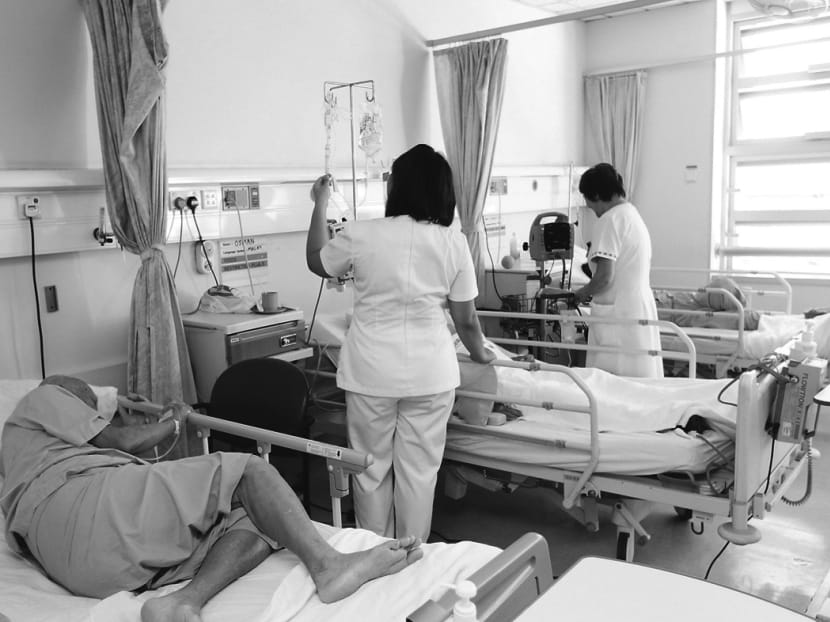From talking about ‘personal responsibility’ to thinking about ‘nation’
Three decades ago, Singapore introduced Medisave, a scheme that would “enable Singaporeans to set aside their own savings to meet future hospitalisation expenses”. Since then, the lexicon of health planners has been filled with phrases such as “personal responsibility” and “avoid over-reliance on the State or medical insurance”. The share of national health expenditure has also increasingly been borne by patients and their families.
Three decades ago, Singapore introduced Medisave, a scheme that would “enable Singaporeans to set aside their own savings to meet future hospitalisation expenses”. Since then, the lexicon of health planners has been filled with phrases such as “personal responsibility” and “avoid over-reliance on the State or medical insurance”. The share of national health expenditure has also increasingly been borne by patients and their families.
On Sunday evening, Prime Minister Lee Hsien Loong framed dramatically “a new way forward”, emphasising to Singaporeans “you will not be facing these challenges alone, because we’re all in this together”.
In his speech, Mr Lee declared that MediShield would become MediShield Life, covering every Singaporean from cradle to grave.
Why this change and some of the others in the Community Health Assist Scheme (CHAS) and outpatient subsidies? There are many reasons why this is long-overdue and it is perhaps worthwhile discussing them now since the Ministry of Health is still mulling the details.
FOR GREATER COST-EFFICIENCY
The first cluster of reasons is technical. Healthcare costs are rising faster than salaries, and insurance is the most efficient way to spread the risk of catastrophic illnesses and large hospital bills. Some of us will die suddenly with almost no healthcare expenses, but some of us will incur massive bills treating cancer, stroke or heart disease and the like.
We, unfortunately, won’t know which group we will fall into. Hence, some will under-save and be vulnerable; others will over-save and forego opportunities to spend the monies meaningfully elsewhere, such as in children’s education.
Secondly, whether it is the Government or citizens, someone has to pay for healthcare. Recalibrating the financing mix is an opportunity to align incentives and minimise some of the wastage in the current hospital-biased, inpatient care system.
With MediShield Life being compulsory, insurers managing the scheme now have the incentive to deploy some of the MediShield dollars away from reactive disease care into proactive preventive health and stronger management of chronic diseases.
By keeping Singaporeans healthy, insurers can incur less expenses years down the road.
It must be a system-wide effort and we must rally all the stakeholders and transform our care model to be as cost-efficient as possible for all of us, public as taxpayers, patients, providers and payers.
VULNERABLE PIONEERS
On the generation of citizens in their late 60s or older, Mr Lee gave the reassurance of a “Pioneer Generation Package”: A one-off exceptional treatment for this group of Singaporeans to “make sure that our pioneer generation will be well covered and will not need to worry about healthcare in their old age”.
There are very strong technical grounds, at least when it comes to healthcare, to treat this group differently. This is the generation that did not benefit fully from the social security schemes such as the Central Provident Fund, Medisave and so on; and thus are vulnerable in today’s high-cost climate.
Their most pressing needs would be two-fold: One, support to enable good care of chronic conditions such as diabetes and high blood pressure, which have small but regular costs associated with medicines and tests (and hopefully this will be met by the expansion of CHAS and increased outpatient subsidies). And two, protection against losing their life savings due to major illnesses such as cancer, which MediShield Life should address.
INVESTMENT IN NATIONHOOD
The second cluster of reasons is political. In healthcare, the top concern among Singaporeans is affordability and this cuts to the core for most of us, not just the lower income but also the middle and higher income groups.
“Personal responsibility” may be good economics, but it is bad politics and even worse nation building. The Government Parliamentary Committee on Health last week highlighted that many identify with the old adage “it is better to die than to fall sick” in Singapore. Why should anyone love and even die for a country that, despite having the most millionaires in the world proportionately, allows its citizens to feel this way?
What the Prime Minister signalled on Sunday is that financials matter, and they will always matter, but people matter more. Healthcare for the people is an investment, an investment in Singaporeans and an investment in nationhood.
Amidst the euphoria of reform, I hope Singaporeans remember Mr Lee also emphasised that the subsidy/3M (Medisave, MediShield, Medifund) model by and large is a sound basis to finance healthcare for everyone else.
For the “future old” who have had the opportunity to set aside monies for healthcare and avail themselves of health insurance, we should be looking instead at how the existing framework can be strengthened to retain the positive elements such as encouraging some personal responsibility and prudence in spending, while overcoming the weaknesses now which, to me, revolve around excessive application of co-payments for virtually all health conditions and the strong financing bias towards hospital care.
The beginning of a new Singapore — yes, it’s as simple and profound as that. Nature teaches that the caterpillar metamorphoses to a beautiful butterfly; but the necessary intervening chrysalis stage is where it is most vulnerable. The Singapore healthcare system is metamorphosing. Let all good men and women continue the exhortations and encouragements that will further the process.
Victor Hugo once said: “There is nothing more powerful than an idea whose time has come.” That time has come, for Singapore.
ABOUT THE AUTHOR:
Jeremy Lim is the author of “Myth or Magic: The Singapore Healthcare System”, which will be on sale in September at all major bookstores and online.







